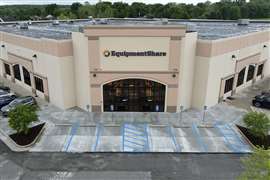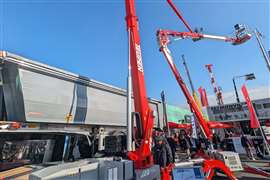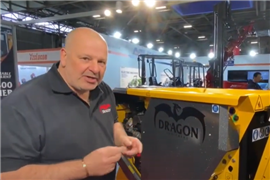Ahern on the US rental scene
22 April 2008
Based in Las Vegas, Ahern Rentals has 44 rental branches in Nevada, California, and other neighbouring States in the US. It has a fleet comprising 35000 items, including 2000 telehandlers, 5000 self-propelled booms and 13000 scissor lifts.
Although aerial platforms and telehandlers dominate the business, Ahern has 15000 other pieces of equipment such as skid-steer loaders and power tools. It operates one of the youngest fleets of any of the major US renters, averaging around 2 years. The company reported revenues of over US$90 million for the three months to the end of September 2007.
IRN: What is the current focus of Ahern Rentals?
Don Ahern: Ahern Rentals is focused on in-store growth because we created nine new stores last year. So I like to kind of grow out and then focus inward and then move forward again.
Right now we’ve stopped our purchasing to a large degree. As the economy starts to get a little rocky here, I’m kind of on a little analysis period, let’s call it; trying to see which way the world is moving. I don’t want to keep growing [as if economic growth] was endless.
We’ve stopped opening new stores, we’ve stopped purchasing a lot of equipment – we are purchasing some—but very specific. Here in Las Vegas we have a lot of nice jobs going on so we’re buying some equipment just to kind of supplement what we can’t fill.
IRN: What is your view about the US economy, and how it will impact the rental sector?
DA: [Talk of recession is] what makes me very cautious. But I can tell you my business is very, very strong right now. Last year was a bigger year for us than 2006, which was a record year. This year we’re running above last year at the same time.
I don’t know where this recession is that people are talking about. But there are certain things in our business that are down. When you dissect it right down with types of equipment, what is down is heavy earthmoving. So that ought to tell you something about what’s coming; if the heavy earthmoving equipment is dropping off, and now some of the smaller earthmoving equipment is dropping off.
Currently, aerial work platforms are still not [dropping]. [But] you’re not going to have an AWP market unless there’s some slabs there. That’s why I’m not being very aggressive right now. Whatever is 100% opposite of aggressive, I’m there right now.
IRN: Is this just locally or all states/locations?
DA: All locations. Out here in the southwest, particularly California, we’re very, very busy in our AWP business. I just don’t know how long it’s going to hold.
IRN: You’ve put a cap on opening new stores?
DA: Just for the immediate term. We will move forward later in the year. We’re sitting tight here, and absorbing the equipment that we received last year, to get our utilisation just right. We want to make sure it’s standing on its legs. It takes energy to expand all the time.
IRN: Your bread and butter is AWP equipment?
DA: Oh yes, the majority of business comes from AWPs. We’ll be buying this year. One thing I’ve always told everyone is that I buy based on the need of our customers: I think the need from customers is going to be down this year, so our buying is going to be down.
IRN: Whose equipment do you buy?
DA: I buy mostly from JLG. In 2007, we were the fifth largest buyer from JLG in North America. I buy mostly from Skyjack on scissors. I bought 3000 scissors from them last year. Our bottom line is largely driven by Skyjack scissors. It probably does a little better because I can get volume dollars. I can’t run enough of them to get rich though!
IRN: What does it take to compete against the nationals?
DA: Common sense [laughs]. The independent guys are much harder to compete with, so when we scout out new locations, we look for where the nationals are. They are the easiest guys to compete against. The independents charge a little bit more and they take good care of their people.
IRN: The business began with your father renting out equipment, as well as running a gas station?
DA: He started renting hand tools, wrenches, right out of his tool box. He got in the rental game and then by 1960 we had a separate location right down the street from our gas station.
I graduated in 1972 from high school, went to college, came back, worked a few years and then I started my own rental thing, which was scissors, booms and forklifts. At that time scissors and forks, particularly scissors and booms, were a new concept. I guess I just found it interesting. My father and I kind of disagreed that this concept would take over some day and take over scaffolding.
My father was one that wasn’t big on taking on debt. He was very conservative, more typical of that generation. I was young, I didn’t care about debt. ‘Someone loan me the money!’ I would not put him at risk, so I needed to go out on my own.
Somewhere in the early 80s things were moving really fast for me and I was thinking of another store in California, and then the MGM hotel [in Las Vegas] burnt down, creating a lot of work here, so I focused on that job, which gave me a big boost…It took my little business to another level because we made a lot of money. Then we opened up in California. California has always proved to be my best market, my biggest market.
IRN: Is that still true today?
DA: Pretty close. About one third of our business is California, one third Nevada and one third is the rest of the States. That’s the way it looks right now. But California has always been a great state for us to do business in; we have 15 locations down there.
IRN: How do you find running a business today vs. running one then?
DA: Well, the reliability of the equipment back in those days was horrible. You almost had to send a mechanic along with the machines.





